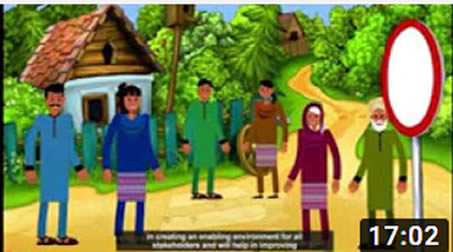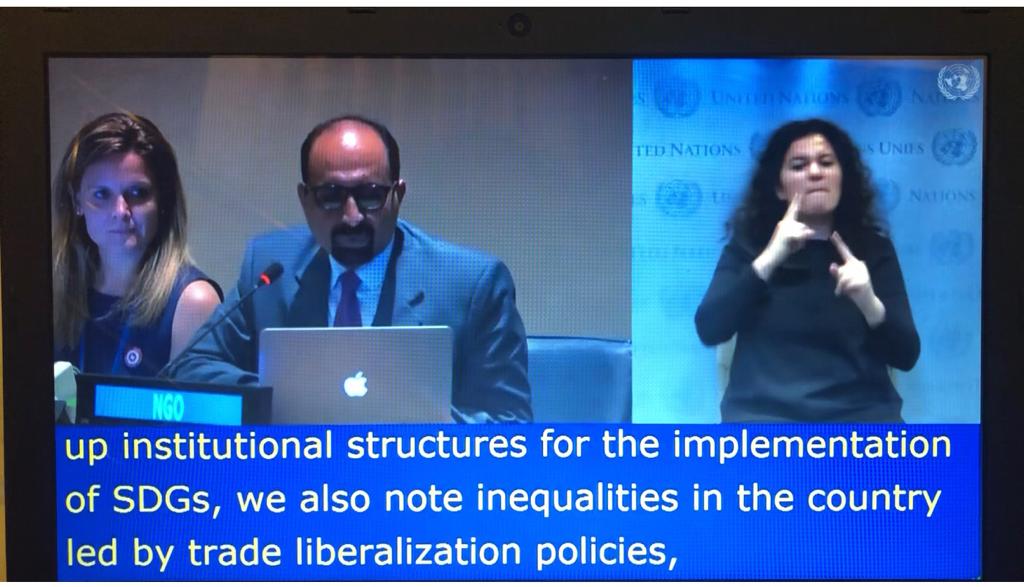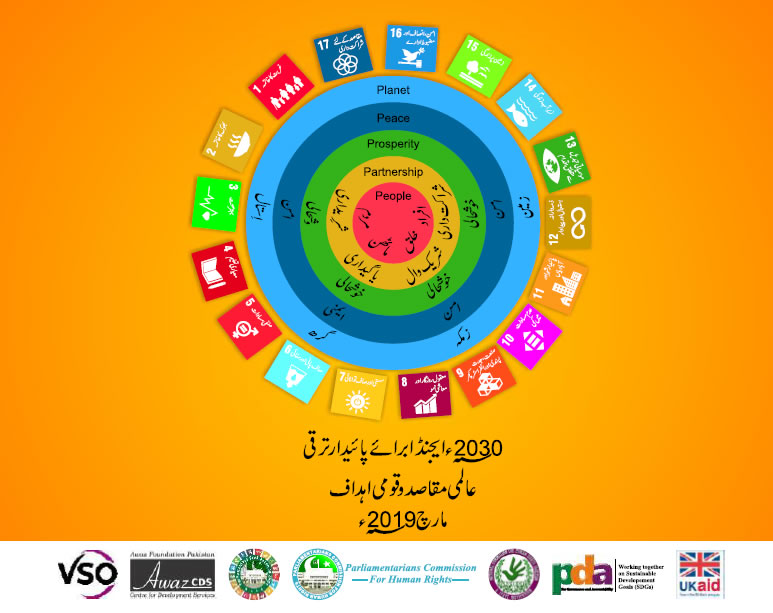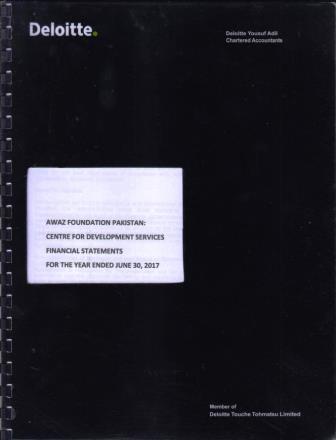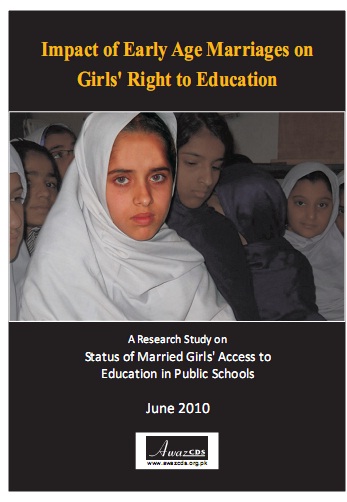Author Archive: Ishfaq Khalil
Pakistan CSOs statement on VNR at UNHLPF
Pakistan CSOs statement on VNR at UNHLPF
We, civil society representatives from Pakistan, representing women, youth, people living with disabilities, older persons, religious and sexual minorities and indigenous populations, take this opportunity to congratulate the Government of Pakistan, for presenting Voluntary National Review of SDGs implementation status in Pakistan.
We appreciate government for setting up institutional structures like Parliamentary Task Forces and SDGs Units at national, provincial and regional levels to facilitate and oversight the implementation processes towards the achievement of SDGs. We also appreciate the approval of National Priority Indicators Framework for the implementation of SDGs, however we have noted that progress on national priority indicators framework was not considered while reporting for VNR rather the processes and promises made towards the achievement of SDGs were shared through VNR report.
We are disappointed to note that the report apparently focuses on three of the six priority SDGs for this year’s HLPF review, including Goals 8, 13 and 17, whereas Goals 4, 10 and 16 are not discussed in standalone segments. This limits debate on the critical precursors to sustainable development that carry significant weight in the context of Pakistan. The report also failed to capture and highlight the Citizens’ Voices on VNR process and progress on SDGs collected through stakeholders’ consultations held in 42 district of Pakistan.
We note with concern the widening inequalities in the country, with little discussion found on means to address their root causes. Recent developments show a declining annual growth rate; high anticipated levels of inflation; rising food insecurity; rising debt to GDP ratios; shrinking resources for public goods and services (particularly sexual reproductive health and education); increasing share of debt servicing; patriarchy and fundamentalisms; ageism; democratic; democratic and civic spaces and violations of fundamental human rights and gender based discriminations. These combined with lack of access to public information, and critical data gaps related to natural resources, biodiversity, urban life, climate change, responsible production and consumption, peace and justice, and WASH, and overall democratic backsliding, are likely to leave many behind.
We call upon the government to address data gaps to gauge the true progress of SDGs, build better coordination among public, private and civil society organizations, strengthen local governments, ensure rule of law and justice for all, create enabling environment for civil society, incorporate human rights based approaches, adopt inclusive & innovative strategies and ensure ample finances for the implementation of SDGs.
Citizens’ Voices on Voluntary National Review & Status of SDGs in Pakistan 2019
Pakistan is a country where democratic governance, culture, values and practices are still weak due to its geo-political situation and economic vulnerabilities. War against terrorism, subsequent natural calamities like earthquake in 2005 and country wide floods in 2010, 2012 and 2014 further provoked the socio-economic and political challenges. Therefore the attentions towards collective and inclusive decision making, increased transparency, rule of law and access to justice, protection of fundamental freedoms, empowering citizens & civic spaces, strengthening local governance, combating religious extremism, ensuring access to information and peaceful societies remained under stress despite continuous efforts of the subsequent governments. Consequently, combating inequalities, ending gender based violence, early child and forced marriages, child abuse, rising poverty and hunger, provision of basic social amenities and decent working environment and economic growth opportunities have further aggravated. Under such circumstances the new government that took over in August 2018 decided to present the Voluntary National Review of SDGs and initiated the participatory consultative process at national and provincial level in October 2019. However, the focus remained on figuring out the processes to achieve SDGs instead of measuring progress.
In the meanwhile, AwazCDS/Pakistan Development Alliance decided to conduct stakeholders’ consultations at district level to collect Citizens’ Voices from the grassroots to contribute in the National VNR process and report. The voices collected by AwazCDS/ Pakistan Development Alliance member organizations from 42 districts were also shared with concerned government authorities. The government acknowledged our efforts in the national VNR report as well as in the official statement of Pakistan Resident Mission at UNESCAP regional forum held at Bangkok in March 2019. However, the real voices and key findings of this long, comprehensive, inclusive and meaningfully done exercise, require more attentions of all the concerned stakeholders. Therefore, we are sharing the findings and key recommendations of citizens’ led monitoring carried out to review the progress made to achieve SDGs with you and all other related stakeholders on behalf of civil society of Pakistan.
It gives me immense pleasure to present you this comprehensive report titled Citizens’ Voices on Voluntary National Review and Status of SDGs in Pakistan 2019. The report shares the diverse opinion of people and related stakeholders regarding progress on the implementation of SDGs. Some views are much critical that includes the lack of ownership by the governments, inefficiencies and the dominance of non-democratic forces over strategic level decisions making negatively affected the implementation of SDGs agenda. Furthermore, unreliable data used as baselines weakened the legitimacy of the proposed framework and SDGs implementation processes. The report is primarily limited to only six priority SDGs (4,8,10,13,16 & 17) as set forth by UNHLPF for the voluntary national review for the year 2019.
Above than all, the report shares the real grassroots voices and results of first ever citizens’ led monitoring mechanism to assess the status of SDGs, adopted by the CSOs independently under aegis of AwazCDS/ Pakistan Development Alliance. The process and findings of this report sets the way forward for more innovative actions in future for measuring the progress on SDG.
Download PDF
Impact of Early-Age Marriages on Girls Right to Education
Early age marriage of girls is not only violation of their right to education but at the same time girls are deprived of their right to childhood, health and choosing husband of their own choice. It can be considered as a dilemma of our society that a woman is shipped into certain type of traditional roles which deprives her of her rights and ultimately she loses her identity. This showed that directly or indirectly a young girl is deprived of the control to her life. Now, if we give a glance to Pakistan, we come to know that it is one among 12 world countries that spend less than 2 percent of their GDP on education. The world bank reports that the average Pakistani boy receives only five years of schooling ; the average girl just 2.5 years.

